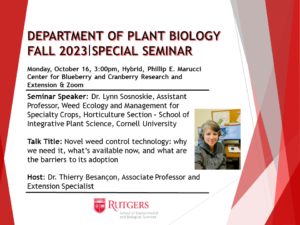In a Specialty Crop Research Initiative (SCRI) grant designed to guide future solution and resources centered around field equipment sanitation, collaborative team comprising pathologists, weed scientists, agronomists, and experts in agricultural equipment sanitation has crafted a questionnaire. This questionnaire is designed to gather growers’ input on their current practices and determine the necessity for implementing new ones.
The research will develop a more comprehensive understanding of the challenges associated with field equipment sanitation and work toward developing solutions that are effective, implementable and sustainable.
To introduce the survey and forthcoming research effort, Dr. Matt Grieshop, lead PI on this project indicates that “We are a group of agricultural research and extension professionals from across the United States that are curious about grower and agricultural professional perceptions about the importance of field equipment sanitation to mitigate the spread of organisms that pose human health, weed, plant pathogen or other risks.
Agricultural field equipment includes tillage implements, tractors, harvesters, cultivation equipment, trucks, trailers, sprayers, mowers, or any other piece of equipment that is shared across fields.
This information will be solely used to help frame future research questions and outreach activities. It will not be published or distributed in any form. Answering should take 5 minutes or less and is completely voluntary and anonymous.
Your participation is invaluable to future developments in the industry regarding food safety and equipment sanitation. We need more inputs from New Jersey specialty crops growers so that they have a say on the direction that field equipment sanitation research will take in the future!
To contribute, visit here or scan the QR code below.

If you have questions, comments or concerns contact Dr. Matt Grieshop at mgriesho@calpoly.edu or Dr. Thierry Besancon at thierry.besancon@rutgers.edu.

